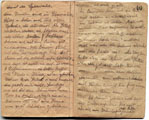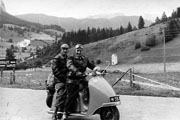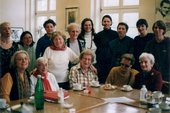Hermine Nierlich-Jursa
"The fight has gone on."
Hermine Nierlich arrived in Vienna on 21 June 1945. She was suffering the effects of the concentration camp imprisonment and her long journey home. Nevertheless, she immediately became involved in the KPÖ (Austrian Communist Party), which had to be reorganized. With other comrades, she cleared the Paulusplatz of the debris, and glazed windows for many people in Erdberg (a district of Vienna). In 1945, she met her second husband Wilhelm Jursa, who had survived the Dachau concentration camp as a political prisoner. Hermine Jursa worked for the KPÖ in the Erdberg district group as a consultant on education and women's affairs. Later she became active in the peace movement. Until she died, she was involved in the Austrian "Lagergemeinschaft Ravensbrück" (camp community, the association of former concentration camp prisoners). She worked as a telephone receptionist until 1963. Hermine Jursa cultivated her contacts with people from different countries whom she had met during persecution, and tried to preserve the memory of those who had been murdered.
Hermine Nierlich-Jursa died of cancer in February 2000.
In 2002, a street in the third Viennese district was named after Hermine Jursa.
"Well, I didn't just sit there and study the past. On the contrary, I didn't have time to think, right. Because – I was in demand, I was absolutely in demand, yes. And the fight has gone on."
"When we – experienced so much rejection, after coming back. What we lived to see of twisted brains! What damage Fascism had done. Yes, that was a great disappointment for us."
"The past is catching up with us again, more or less. Yes. That's how things are. And I, me and many others, think that that is a good thing, too, that this happens, (...) that this is really revealed now, that people talk about it. I think that is – necessary, too, for Austrian history. It was women, there have been women here, who autonomously – did something, without anyone driving them to do it. (...) Because each one of them staked her head."
Political new beginnings
The Austrian communist resistance lost more than 2,000 people under the National Socialist persecution. As for the illegal resistance group, which Hermine Jursa had been active in, most of the comrades had survived and turned to various political activities after 1945. For Hermine Jursa, her friendship with the women whom she had met in the Ravensbrück concentration camp, and with whom she had undertaken resistance, took precedence. She especially admired the communist Melanie Ernst, one of the organizors of camp resistance. She took care of her until her death. Melanie Ernst died in 1949, from the consequences of her imprisonment in the concentration camp.




